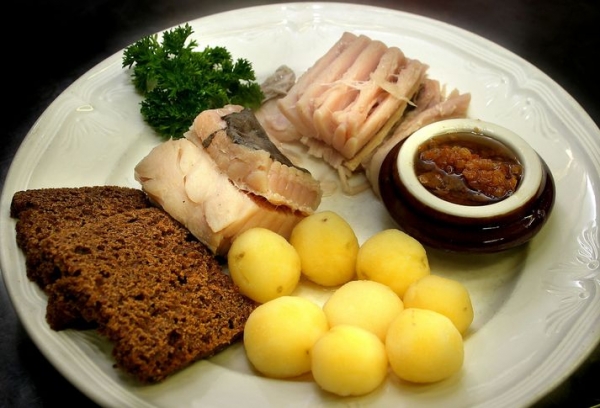December 23 is Þorláksmessa, the feast of St. Thorlákur (or Thorlac) one of the most important days in Iceland. It marks the last day of preparations for Christmas in Iceland. Many families decorate the Christmas tree on Þorláksmessa. Þorláksmessa is also the feast of Iceland's only Catholic saint, Þorlákur Þórhallsson, the bishop of Skálholt, one of the two medieval bishoprics in Iceland, from 1178-1193.
Read more: St Þorlákur, patron saint of Iceland and people with Autism
Þorlákur was recognized as a saint by the Icelandic parliament in 1198, but was only canonized by the pope 800 years later, in 1984. Throughout the centuries Icelanders recognized him as the patron saint of the poor and the common folk, and upon his canonization by the pope he was recognized as the patron saint of Iceland. In recent years some have been pushing to have him recognized as the patron saint of people with autism or autism spectrum disorders.
The Icelandic parliament recognized St Þorlákur as a saint in 1198, and the next year designated December 23 as the feast of St. Þorlákur. Despite the fact that Catholics are only a tiny minority in Iceland Þorláksmessa continues to play an extremely important role in the Christmas preparations of Icelanders.
Fermented Skate

Traditionally Icelanders ate fish on the feast of St. Þorlákur, as it was also the last day of the catholic Christmas fast. In West Iceland, especially the Westfjords, people ate fermented skate on the feast of St. Þorlákur, a tradition which then spread throughout Iceland in the 20th century.
Fermented skate is one of the traditional Icelandic foods which appear least appetizing to uninitiated foreigners. The pungent, rich smell of ammonia and the strangely gelatinous flesh might make it hard to swallow, but fermented skate is nevertheless considered a great delicacy. But while many Icelanders can't wait for Þorláksmessa to feast on skate, others hate it, describing it as no different from eating rotten fish.
Read more: Popularity of the traditional delicacy fermented skate is slipping, worrying some Icelanders
If you are interested in participating in this tradition and thus experience a key element of traditional Icelandic Christmas you can find skate served at numerous restaurants. Finding these is usually pretty simple: Just follow the smell!
December 23 is Þorláksmessa, the feast of St. Thorlákur (or Thorlac) one of the most important days in Iceland. It marks the last day of preparations for Christmas in Iceland. Many families decorate the Christmas tree on Þorláksmessa. Þorláksmessa is also the feast of Iceland's only Catholic saint, Þorlákur Þórhallsson, the bishop of Skálholt, one of the two medieval bishoprics in Iceland, from 1178-1193.
Read more: St Þorlákur, patron saint of Iceland and people with Autism
Þorlákur was recognized as a saint by the Icelandic parliament in 1198, but was only canonized by the pope 800 years later, in 1984. Throughout the centuries Icelanders recognized him as the patron saint of the poor and the common folk, and upon his canonization by the pope he was recognized as the patron saint of Iceland. In recent years some have been pushing to have him recognized as the patron saint of people with autism or autism spectrum disorders.
The Icelandic parliament recognized St Þorlákur as a saint in 1198, and the next year designated December 23 as the feast of St. Þorlákur. Despite the fact that Catholics are only a tiny minority in Iceland Þorláksmessa continues to play an extremely important role in the Christmas preparations of Icelanders.
Fermented Skate

Traditionally Icelanders ate fish on the feast of St. Þorlákur, as it was also the last day of the catholic Christmas fast. In West Iceland, especially the Westfjords, people ate fermented skate on the feast of St. Þorlákur, a tradition which then spread throughout Iceland in the 20th century.
Fermented skate is one of the traditional Icelandic foods which appear least appetizing to uninitiated foreigners. The pungent, rich smell of ammonia and the strangely gelatinous flesh might make it hard to swallow, but fermented skate is nevertheless considered a great delicacy. But while many Icelanders can't wait for Þorláksmessa to feast on skate, others hate it, describing it as no different from eating rotten fish.
Read more: Popularity of the traditional delicacy fermented skate is slipping, worrying some Icelanders
If you are interested in participating in this tradition and thus experience a key element of traditional Icelandic Christmas you can find skate served at numerous restaurants. Finding these is usually pretty simple: Just follow the smell!







